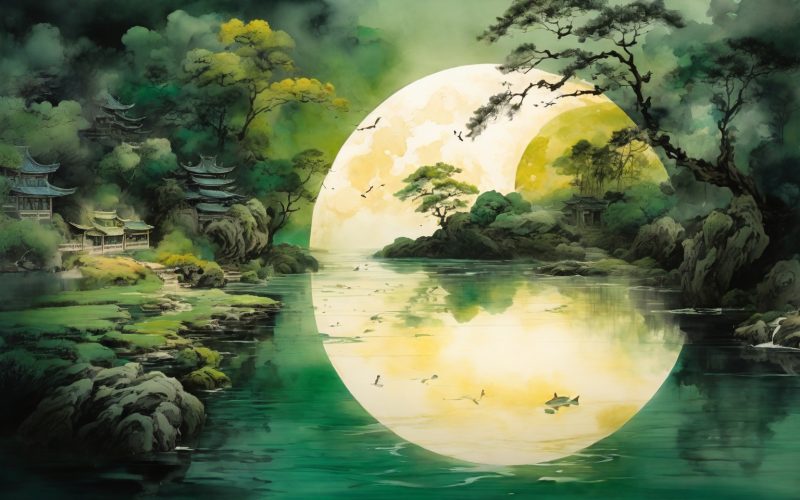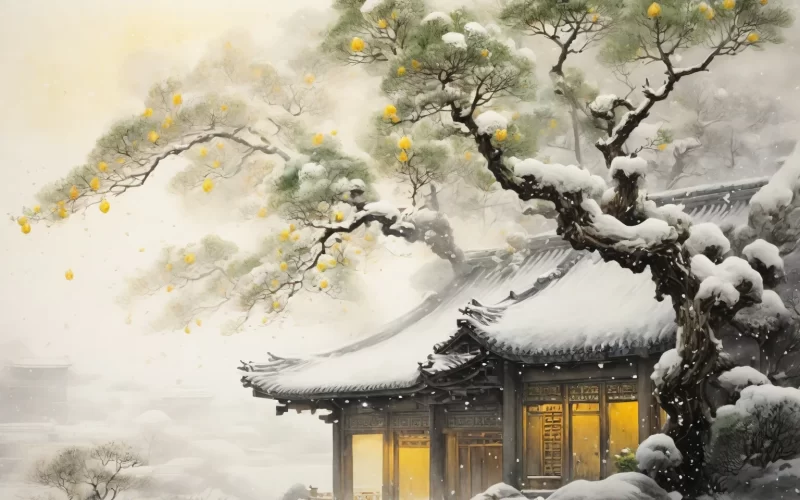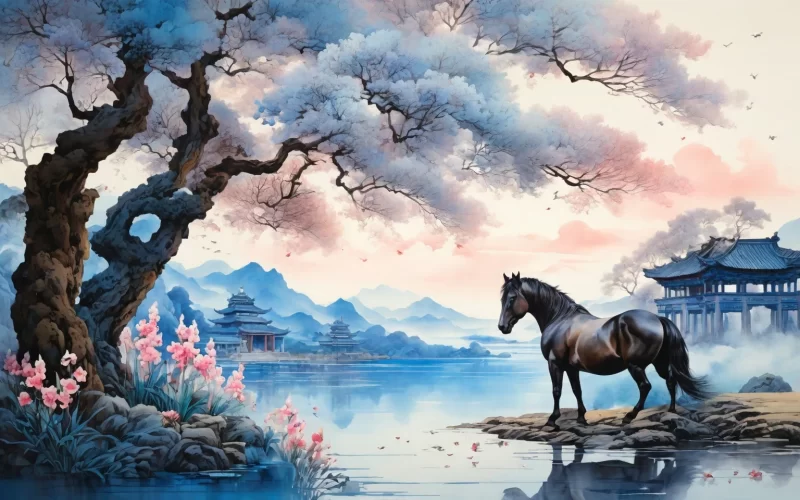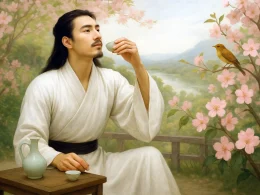The eyebrow-like cool moon hangs over Willow Bay,
The southern mountains seem in the mirror to sway.
Three days rain's fallen with peach petals on the stream;
At midnight on the beach leap the fish, carp and bream.
Original Poem:
「兰溪棹歌」
戴叔伦
凉月如眉挂柳湾,越中山色镜中看。
兰溪三日桃花雨,半夜鲤鱼来上滩。
Interpretation:
This poem vividly portrays the picturesque scenery of Lanxi and the lively charm of a fisherman's life, exuding the rhythm of a folk song. The poet, with a fresh and natural touch, depicts the beauty of Lanxi on a moonlit night and the animated scene of carp leaping over the shallows after a spring rain. The first two lines describe Lanxi at night: the crescent moon, like a delicate eyebrow, is reflected in the clear stream, while the surrounding mountains appear as though they are embedded in a mirror-like water surface, creating an elegant and dreamlike atmosphere. The latter two lines capture the vitality of spring after the rain, as the rising water level encourages schools of carp to swim upstream, bringing dynamism and energy to the tranquil night. Though the poem does not directly depict people, the reader can sense the fishermen's joy through its imagery. By expressing emotions through scenery, the poet imbues the poem with a graceful, fluid beauty.
First Couplet: “凉月如眉挂柳湾,越中山色镜中看。”
liáng yuè rú méi guà liǔ wān, yuè zhōng shān sè jìng zhōng kàn.
The crescent moon, delicate as an eyebrow, hangs silently above a willow-shaded bay; the clear waters, like a mirror, reflect the mountains of Yue.
This couplet uses a refined metaphor to portray the serene beauty of Lanxi at night. “凉月如眉” likens the crescent moon to a young maiden’s elegant eyebrows, while the word “凉” (cool) conveys the refreshing air after a spring rain. “挂柳湾” presents a poetic image where the moon and the willows complement each other, creating a tranquil and artistic scene. “越中山色镜中看” employs contrast by using the water as a mirror to reflect the distant mountains, adding a misty, ethereal charm, as if the entire world is immersed in moonlight and water.
Second Couplet: “兰溪三日桃花雨,半夜鲤鱼来上滩。”
lán xī sān rì táo huā yǔ, bàn yè lǐ yú lái shàng tān.
For three days, the peach-blossom rain has fallen over Lanxi; at midnight, carp leap onto the shallows, carried by the rising waters.
This couplet shifts from stillness to motion, illustrating the vitality brought by spring rain. “桃花雨” signals the season—during the second or third lunar month in the south, peach blossoms bloom while continuous spring rains raise the water levels, yet the stream remains clear. “半夜鲤鱼来上滩” not only depicts the vivid scene of fish leaping but also subtly reflects the fishermen’s anticipation of a bountiful harvest. The night, initially silent, is stirred by the sounds of jumping carp, making the imagery more dynamic. This is not just a lively depiction of the fishermen’s world but also an expression of the exuberant energy of nature.
Overall Appreciation
The poem skillfully blends motion and stillness to paint a vivid picture of Lanxi’s serene waterscape and the fishermen’s thriving life. The opening lines, “凉月如眉,” evoke a sense of nighttime tranquility, while “山色镜中看” enhances the dreamlike quality of the scenery. Then, with “桃花雨,” the poet transitions to the rising waters brought by spring rain, and “鲤鱼上滩” introduces the lively movement of fish, shifting the poem’s focus from static beauty to dynamic vitality. Though human figures are absent, the imagery allows readers to envision the fishermen’s busy yet joyful existence on the spring waters. This subtle expression lends the poem an enduring poetic depth.
Writing Characteristics
- Elegant Metaphors and Fresh Imagery: The poet compares the crescent moon to an eyebrow and the water to a mirror, enhancing the poetic charm of the scene.
- A Blend of Stillness and Motion: The first couplet captures the serene night, while the second couplet enlivens the scene with fish leaping, creating a dynamic contrast.
- Implicit Expression of Emotion: Though the poem does not directly describe people, it conveys the fishermen’s love for life through its vivid imagery.
- Folk Song Influence with Natural Language: The poem’s simple and smooth language, combined with its rhythmic flow, gives it a strong folk-song quality, making it melodious and easy to recite.
Insights
This poem not only showcases the ethereal beauty of Lanxi’s landscapes but also reflects the poet’s admiration for nature and the fishermen’s way of life. Without explicitly stating emotions, the scenery itself breathes with a sense of livelihood, immersing the reader in a world of shimmering water and tranquil mountains. It reminds us that nature’s simplest elements—raindrops, moonlight, and leaping fish—contain endless poetic charm and beauty. If we observe closely, we can find moving poetry in even the most ordinary of scenes.
Poem translator:
Xu Yuan-chong (许渊冲)
About the Poet:
Dai Shulun (戴叔伦), 732 - 789 AD, was a native of Jintan, Jiangsu Province. During the Anshi Rebellion, he lived in Poyang and studied behind closed doors, and was later recruited by Liu Yan to serve in the Transit House. Dai Shulun's poems mostly express the leisure of a secluded life, and there are also some poems exposing social contradictions and reflecting the people's hardships, with a broader content, and his poetic style is elegant and clear.












